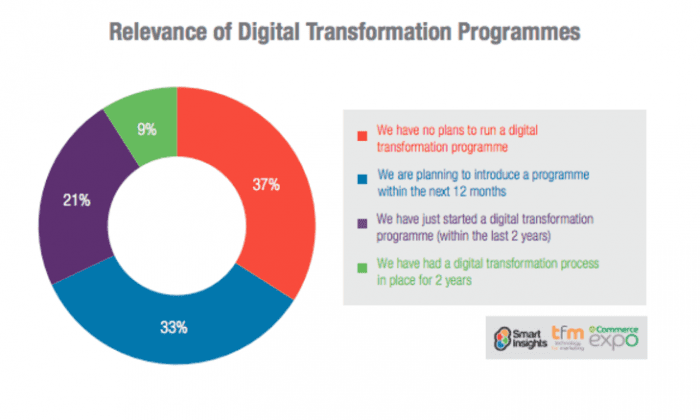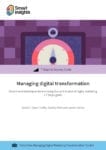What are the next big changes to digital that will affect digital marketing strategies in 2018?
Recently on behalf of Smart Insights, I gazed into the crystal ball to forecast some marketing and branding trends for 2018.
In this article, I am going to concentrate on five digital aspects which I believe will, in some way or other, affect just about everyone next year.
To being with, as this chart by Smart Insights, in collaboration with TFM, demonstrates, more businesses than ever are putting digital transformation programmes in place. Yet still, according to Smart Insights, some 50% of businesses don't have an integrated Digital Marketing Strategy.

For more trends covering how to integrate digital media and technology to increase the contribution of digital marketing in 2018, check out Dr Dave Chaffey's article on the 10 trends for 2018 where he talks about integrating marketing technology, integrating marketing activities into the customer lifecycle and integrating content marketing into a customer engagement strategy.
Prediction 1: People close final mile of the consumer journey
Elon Musk (one of PayPal’s founders) would love us to finally become a totally cashless society – leaving rather than loose change, digital footprints and so data wherever we step. However, for now, not every transaction starts and ends online. In fact, according to Pricewaterhouse Coopers, when Gen Z-ers go shopping, they actually prefer to at least complete the customer journey at physical stores.
Consumers of all ages are more clued-up than ever on the what’s, whys, how’s, and when’s of purchases. Strides ahead of stepping into a store, they have checked out vlogs, blogs, reviews, comparison sites…
They are no longer merely customers – but accustomed experts. They also remain people. Which is why details such as the physical touch of a product along with words of reassurance remain the final hurdle in the customer sales journey.
2018 will see more BAMs (Bricks and Mortar) brands delve deeper into analyzing the steps that bring consumers to the checkout counter. Drawing on such data, upon arrival at the store, similar to swiping payment devices, customers will increasingly scan personal devices to be instantly recognised by the store’s system and ‘handed-over’ to an assistant ready to add the human reassuring touches, so closing the deal in ways still far from being mastered by Artificial Intelligence.
Prediction 2: Digital closes the final mile of the consumer journey.
Face-to-face store assistants can naturally spot aisles away a potential customer. For example, a cosmetics assistant intuitively recognizes when someone deserves a little “me-time.” The consumer is pampered. Questions are designed to provide advice on the best combination of make-up for a special occasion. The cosmetics are sold.
From 2018 I predict that increasingly more of the data recorded at such everyday human-triggered sales cycles will, thanks to digital, receive a far longer-shelf-life.
In my example, colour charts, styles and so on… will deliver far greater potential than purely being a useful after-sales reference download. The more the data is accessed, the more empowered the consumer will become. Ever-evolving – learning algorithms will help guide the consumer months and even years after an initial consultation. Best of all, instead of coming across as overly intrusive, everything will feel personally empowering.
Thanks to intelligent (human managed) digital stratagems, campaigns will leave the impression of being more natural – and so individual than ever. (Which helps explain why, according to the Wall Street Journal, the majority of cosmetics brand Sephora’s tech-workers are currently female).
Prediction 3: One by one, the Four Pillars blocking digital transformation will topple.
Suspicion and chariness from luddites have long been thorns in the side against digital progress. Yet as the irrefutable maths of digital being the logical step towards greater efficiencies and ultimately business add up, the four main inhibitors currently blocking digital integration and transformation will begin to tumble.
Namely:
First Pillar: Insufficient management buy-in.
Given the clear Return on Investments proof, even executives currently with small appetites for digital, will (gradually) realize that rather than try to halt waves of progress, it’s time to embrace digital’s tsunami leading to a sea of transformation.
Second Pillar. Redundant legacy systems and processes.
Many enterprises are still not yet fully aligned around digital customer digital experiences. Simply trying to keep up with digital, some back-office systems are hobbling along. However, the days for such ‘Hop-a-Long Casiddies’ are numbered: the ceaseless demand for digital completely overwhelms yesterday’s excuses to just make-do and hope to get by.
Data siloes by channel and products or services interfere with a full customer view. Therefore, I predict that a positive inevitable consequence of increased overhauling of back office systems will be the closer cooperation between departmental silos. Simply put, the more seamless digital makes the customer journey experience, the more people from departments as diverse as HR, legal (especially with issues surrounding digital privacy laws) distribution, training, accounts … will talk to each other - to get the job done.
Third Pillar. Lack of skilled resource
Currently, even the biggest corporations are having to double-up on personnel responsibilities, whilst also doubling-down on resources to support them. I predict that political issues such as Brexit – which are concerned with entire countries and continents remaining competitive - will spur investment in people-centric digital knowledge programmes that ensure individuals and departments alike will have the skills to grow.
Fourth Pillar. Data-tech intolerance
Franklin Roosevelt once said: “the only thing we have to fear is fear itself.” Recently that anxiety has been very publically applied to digital, and in particular - the woolly subject of Big Data. YouTube documentaries and academic forums discussing “Big Data – Big Brother” warnings have become cottage industries creating armies of worrywarts and cynics.
Undeniably, digital’s Big Data system touches every aspect of lives from buying stocks to ordering food… managing campaigns… even finding love. 2018 will see the next iteration of its development. Just as the lack of skilled resources are set to topple, so it follows that knowledge - rather than hearsay - won’t simply drive change for change sake – but ensure that inexorable progress will actually become nothing to be feared.
Prediction 4: Customer data on-boarding is finally distinct from customer on-boarding.
Customer on-boarding is all about the process someone undertakes as part of their customer journey. In some of my earlier predictions, I described how digital is primed to improve that journey. As we progress through 2018 and beyond, the further refinement of digital will focus on specialist areas which, though separate, will ultimately work closer towards achieving a greater common purpose. Therefore, I predict digital marketers will gain an even clearer appreciation of each specialty’s role and benefit.
Take “customer data on-boarding.” It's the process of linking offline data with online attributes (cookies, IP address, device IDs, non-cookie identifiers and so on). Winterberry Group estimates that by 2020, the customer data on-boarding market may eclipse $1 billion (a day).
As we head into the first quarter of 2018, the average consumer will get accustomed to connecting up to eight connected devices every day. Back in 2016 connectivity generated close to 44 zettabytes of data. Within 24 months of reading this article, that figure is expected to reach 180 zettabytes.
And those kinds of data-chewing numbers bring me to my final digital in 2018 prediction:
Prediction 5: More digital = greater brand engagement
The more informed society becomes, the greater the understanding, the wider the choices and finally the more people will be willing to engage with brands that deliver useful, timely, appropriate and empathetic knowledge.
It is all part and parcel of a digital future where brands, people, and processes become increasingly harmonized to deliver an authentic customer journey from A-Z.

















